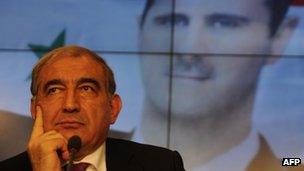Syria envoy says Assad resignation is up for discussion
- Published

Qadri Jamil said the West risks spreading the conflict if it intervenes militarily
Syria's deputy prime minister has said the government is prepared to discuss the exit of Bashar al-Assad, but that the president's resignation cannot be a pre-condition for talks.
Speaking on a visit to Moscow, Qadri Jamil also said the West "is looking for a pretext to intervene militarily".
Echoing Russia's foreign minister, he said there must be no intervention.
However, the US said there was nothing new in his remarks, and Washington wanted Mr Assad to go quickly.
"Frankly, we didn't see anything terribly new there," said US State Department spokeswoman Victoria Nuland.
"Obviously, the longer this goes on, the harder it is, but we still believe that the faster Assad goes, the more chance there is to quickly move on to the day after," she added.
Mr Jamil's comments follow President Obama's warning that the US may intervene if Syria uses chemical weapons.
On Monday, Barack Obama said the deployment of chemical weapons represented a "red line" for the US.
Following talks with China's top diplomat and a Syrian delegation including Mr Jamil, Russian Foreign Minister Sergei Lavrov said only the UN Security Council could authorise the use of force against Syria and warned against imposing "democracy by bombs".
At a press conference, Mr Jamil warned that "any direct military intervention in Syria is impossible".
"Those who contemplate it are rushing into a much wider confrontation, one that goes beyond the Syrian borders," he said.
Although the Syrian regime has said in the past that it is open to unconditional negotiations, Mr Jamil went further by explicitly saying everything could be discussed, including the resignation of President Assad.
Humanitarian call
As talks were going on in Moscow, Syrian opposition activists and residents said at least 20 young men had been killed when government forces seized a suburb of Damascus in the latest round of fighting.
The bodies of several men who had been shot at close range were found inside buildings after the troops withdrew from the town, they added.
In Syria's second biggest city, Aleppo, the opposition said attacks by government aircraft killed more than a dozen people.
Obama: "It doesn't just include Syria. It would concern allies in the region, including Israel, and it would concern us."
A commander in the Free Syrian Army, Col Abdul Jabbar al-Ukaidi, told the AFP news agency that its fighters now controlled "more than 60%" of Aleppo, although a security source in Damascus dismissed the claims.
The UN says that the conflict in Syria, which has been going on for 17 months now, has left 18,000 people dead so far.
On Tuesday, global leaders and aid agencies urged the UN Security council to reach an agreement with Syrian authorities on humanitarian access.
Groups including Save the Children and the Norwegian Refugee Council warned in a letter that thousands of people need help but are being "held hostage" by political deadlock at the UN.
The letter warned that the violence engulfing Syria's towns and cities has displaced hundreds of thousands of people, some of them numerous times.
Mr Lavrov told Syria's deputy prime minister in Moscow that he wanted to hear his plans for "further actions to shift the situation into the channel of political dialogue in order for Syrians themselves to decide their fate without external interference".
After meeting with the Syrians and China's top diplomat, State Councillor Dai Bingguo, he said Moscow and Beijing based their diplomatic co-operation on "the need to strictly adhere to the norms of international law and the principles contained in the UN Charter, and not to allow their violation".
Russia and China have opposed intervention in Syria since anti-government protests erupted in March 2011. They have vetoed three Security Council resolutions seeking to press President Bashar al-Assad to end the violence.
On Monday, President Obama warned Syria's government at a news conference that "there would be enormous consequences if we start seeing movement on the chemical weapons front or the use of chemical weapons".
Mr Obama said that he had not ordered military engagement "at this point", but added that the US was monitoring the situation carefully and had made contingency plans.
In July, the Syrian government admitted that it had chemical and biological weapons and might use them in case of any "external aggression". But it insisted they would "never be used in the Syrian crisis, no matter what the internal developments".
Correspondents say there is also growing unease in Washington that Syria's chemical weapons may fall into what Mr Obama termed "the hands of the wrong people".